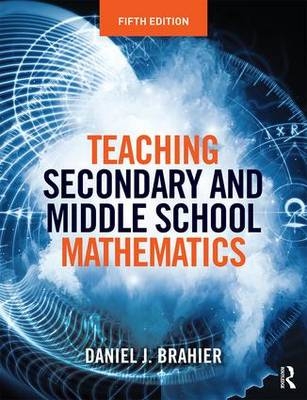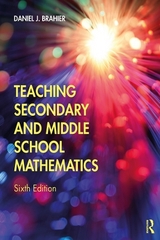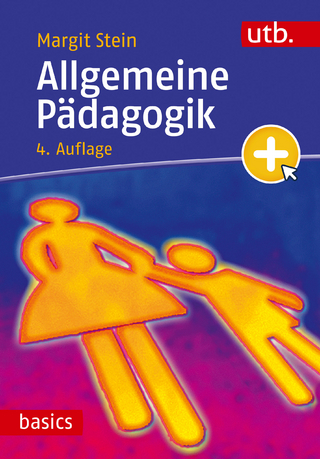
Teaching Secondary and Middle School Mathematics
Routledge (Verlag)
978-1-138-92278-5 (ISBN)
- Titel erscheint in neuer Auflage
- Artikel merken
The fifth edition has been updated and expanded with a particular emphasis on the continued impact of the Common Core State Standards for Mathematics and NCTM’s just-released Principles to Actions, as well as increased attention to teaching with technology, classroom management, and differentiated instruction.
Features include:
A full new Chapter 7 on selection and use of specific tools and technology combined with "Spotlight on Technology" features throughout clearly illustrate the practical aspects of how technology can be used for teaching or professional development.
Foundational Chapters 1 and 2 on the practices and principles of mathematics education have been revised to build directly on Common Core State Standards for Mathematics and Principles to Actions, with additional references to both documents throughout all chapters.
A new Chapter 4 focuses on the use of standards in writing objectives and organizing lesson plan resources while an updated Chapter 5 details each step of the lesson planning process.
A fully revised Chapter 12 provides new information on teaching diverse populations and outlines specific details and suggestions for classroom management for mathematics teachers.
Classroom Dialogues" features draws on the author’s 35-year experience as an educator to present real-world teacher-student conversations about specific mathematical problems or ideas
"How Would You React?" features prepares future teachers for real-life scenarios by engaging them in common classroom situations and offering tried-and-true solutions.
With more than 60 practical, classroom-tested teaching ideas, sample lesson and activities, Teaching Secondary and Middle School Mathematics combines the best of theory and practice to provide clear descriptions of what it takes to be an effective teacher of mathematics.
Daniel Brahier is a professor of mathematics education at Bowling Green State University in Ohio and Director of the Science and Math Education in ACTION scholarship program at BGSU. He also teaches junior high (Grades 7 and 8) mathematics at St. Rose School in Perrysburg, Ohio.
Contents
Preface
Acknowledgements
Meet the Author
UniT 1 What Does It Mean to "Do," "Teach," and "Learn" Mathematics?
Chapter 1 Mathematics as a Process
National and International Assessment Data
How Would You React?
The Need for Reform
"Doing" Mathematics
Problem Solving
Mathematical Reasoning
Spotlight on Technology
Communication
Connections and Structure
Representation
Classroom Dialogues
Conclusion
Glossary
Discussion Questions and Activities
Chapter 2 Principles of Mathematics Education
The Six Principles
Teaching and Learning
How Would You React?
Access and Equity
Curriculum
Tools and Technology
Spotlight on Technology
Assessment
Professionalism
Classroom Dialogues
Connecting the Principles
Conclusion
Glossary
Discussion Questions and Activities
Chapter 3 Learning Theories and Psychology in Mathematics Education
Research in Mathematics Education
Quantitative and Qualitative Methods
How Would You React?
Experimental and Descriptive Research
Learning Theories in Mathematics
Development of Learning Theory
Bruner's Stages of Representation
The van Hiele Model
The Inquiry Approach and Constructivist Model
Spotlight on Technology
Inductive versus Deductive Teaching
Classroom Dialogues
Motivation
Conclusion
Glossary
Discussion Questions and Activities
Unit 2 Mathematics Curriculum AND PLanning
Chapter 4 Standards, Objectives, and Resources
Developing Curriculum Standards - Historical Perspective
How Would You React?
The Common Core State Standards for Mathematics
The Core Curriculum
Traditional versus Integrated Sequences
Spotlight on Technology
Goals and Objectives in the Mathematics Classroom
Classifying Objectives
Affective Objectives
Cognitive Objectives
Selection and Organization of Resources
Print Resources
Classroom Dialogues
The Internet
Organizing a Resource File
Conclusion
Glossary
Discussion Questions and Activities
Chapter 5 Planning for Instruction
Unit Planning
How Would You React?
Lesson Planning
General Information
Standards and Objectives
Materials and Resources
Motivation
Lesson Procedure
Closure
Extension
Assessment
Spotlight on Technology
Sample Lesson Plans
Classroom Dialogues
Lesson Imaging versus Lesson Planning
Reflecting on a Lesson
Conclusion
Glossary
Discussion Questions and Activities
Unit 3 Mathematics TEACHING
Chapter 6 Teaching and Learning: Tasks, Learning Environment, and Discourse
Teaching Standards and Related Principles
The NCTM Standards for Teaching and Learning Mathematics
Knowledge Standards
The Teaching and Learning Principle
Selecting Activities and Problems
How Would You React?
Learning Environment
Spotlight on Technology
Classroom Discourse
The Role of Discourse
Questioning Skills
Reading and Literacy
Classroom Dialogues
Cooperative Learning
Reflective Practices
Conclusion
Glossary
Discussion Questions and Activities
Chapter 7 Teaching and Learning: Tools and Technology
How Would You React?
Classroom Tools
Hand-On Manipulative Materials
Spotlight on Technology
Diagrams, Graphs, and Other Discussion Starters
Classroom Technology
Calculators
CAS Technology
Interactive Whiteboards
Mobile Devices
Classroom Dialogues
Dynamic Geometry Software
Document Cameras
Blended Classes and Flipped Classrooms
Conclusion
Glossary
Discussion Questions and Activities
Chapter 8 Teaching Number Sense and Algebra
Reasoning and Sense Making
How Would You React?
The Teaching of Number Sense
Sample Lesson Plan: Number Sense
Number Sense-Activities Sampler
Spotlight on Technology
The Teaching of Algebra
Sample Lesson Plan: Algebra
Classroom Dialogues
Algebra-Activities Sampler
Conclusion
Glossary
Discussion Questions and Activities
Chapter 9 Teaching Geometry, Statistics/Probability, and Discrete Mathematics
The Teaching of Geometry
Sample Lesson Plan: Geometry
How Would You React?
Geometry-Activities Sampler
Spotlight on Technology
The Teaching of Statistics and Probability
Sample Lesson Plan: Statistics and Probability
Statistics and Probability-Activities Sampler
The Teaching of Discrete Mathematics
Sample Lesson Plan: Discrete Mathematics
Classroom Dialogues
Discrete Mathematics-Activities Sampler
A Word on Pre-Calculus and Calculus
Conclusion
Glossary
Discussion Questions and Activities
Unit 4 Assessment in MathematicS
Chapter 10 The Role of Assessment
What Is Assessment?
Purposes for Assessment
Test Construction
Preparing Items
Ensuring Validity and Reliability
Scoring Student Work
How Would You React?
Including Review Items
Limitations to Written Tests
Alternate Strategies for Assessing Student Progress
Journals
Open-Ended Questions and Rubrics
Spotlight on Technology
Individual and Team Projects
Observations and Checklists
Interviews
Self-Assessment
Classroom Dialogues
Portfolios
Conclusion
Glossary
Discussion Questions and Activities
Chapter 11 Assessment: Standards, Homework, and Grading
NCTM Recommendations on Assessment
The Assessment Standards
How Would You React?
The Assessment Principle
Equity and Assessment
Homework Assignments
Homework Amount and Frequency
Checking Homework Assignments
Spotlight on Technology
Using Homework Assignments in Assessment
Classroom Dialogues
Evaluation: Maintaining and Determining Final Grades
Conclusion
Glossary
Discussion Questions and Activities
Unit 5 Meeting Individual Student and Teacher Needs
Chapter 12 Managing a Mathematics Classroom
Defining and Achieving Equity
Students with Special Needs
How Would You React?
Gender
Spotlight on Technology
Ethnic and Cultural Issues
English Language Learners
Classroom Dialogues
Ideas for Meeting Diverse Student Needs
Differentiated Instruction
General Suggestions for Differentiating in the Classroom
Classroom Management Tips
Conclusion
Glossary
Discussion Questions and Activities
Chapter 13 The Teacher of Mathematics in the School Community
Working with Parents
How Would You React?
The Supervision and Evaluation of Teachers
Spotlight on Technology
Functioning in a Department
Ongoing Professional Development
Making the Case for Long-Term Development
Classroom Dialogues
Opportunities for Professional Development
The Professional Development Plan
Conclusion
Discussion Questions and Activities
Bibliographic References and Resources
Index
| Erscheinungsdatum | 31.03.2016 |
|---|---|
| Zusatzinfo | 144 Line drawings, black and white; 21 Halftones, black and white; 17 Tables, black and white; 165 Illustrations, black and white |
| Verlagsort | London |
| Sprache | englisch |
| Maße | 216 x 279 mm |
| Themenwelt | Schulbuch / Wörterbuch |
| Sozialwissenschaften ► Pädagogik ► Allgemeines / Lexika | |
| Sozialwissenschaften ► Pädagogik ► Schulpädagogik / Sekundarstufe I+II | |
| ISBN-10 | 1-138-92278-1 / 1138922781 |
| ISBN-13 | 978-1-138-92278-5 / 9781138922785 |
| Zustand | Neuware |
| Informationen gemäß Produktsicherheitsverordnung (GPSR) | |
| Haben Sie eine Frage zum Produkt? |
aus dem Bereich



